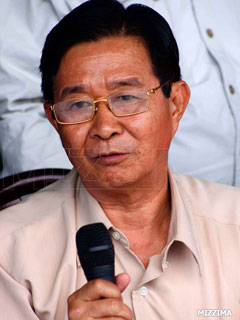Burma’s peace negotiator says all remaining armed rebel groups should have cease-fire deals signed within three months. After that, he said, will come dialogues on-going dialogues intended to provide “everlasting peace.”

In his first interview with a foreign news organization, Aung Min, a retired general and the current minister for rail transportation appointed by President Thein Sein to solve the decades old hostilities, told Reuters news agency on Wednesday the government and ethnic armed groups were beginning to trust each other.
“This is a chronic disease that has been happening for over 60 years. Successive governments couldn't cure the disease because the remedy didn't fit,” Aung Min told the agency in his first interview with a foreign news group.
Burma has changed, he said, allowing for a new approach to peace talks. After the cease-fires, the negotiations will cover broad areas, such as ethnic groups’ longing for a true federal system, with broad powers granted to states or regions, similar to systems in the U.S. and the European Union.
Nine of 16 rebel groups have signed cease-fire agreements with the government, he said, and he expected six more agreements to be reached within a few months. The Kayah Nationalities Progressive Party (KNPP) would sign a deal on March 1, he said, and five smaller parties were expected to sign soon.
He declined to comment about the fighting still going on in Kachin State despite an order by President Thein Sein and the armed forces commander-in-chief for troops to end offensives.
The era of former junta leader, Senior General Than Shwe, who ruled Myanmar during an era of brutal suppression of democratic groups, is over. He said Than Shwe had no influence in the current government, in which he played a large role in putting it in place.
“Than Shwe has retired completely. We don't need to follow his orders or influence. There is now virtually no contact,” he was quoted as saying. He said Than Shwe spends a lot of time reading now, and the country owned him thanks for putting in place a peaceful transition to democracy.
Regarding rumours of tensions between more democratic and more conservation groups in the government and military, he said they were just rumours and “we are all” for President Thein Sein.
He credited Thein Sein as putting in place a “three-step plan” for peace, first involving cease-fires, followed by political negotiations, followed by a special assembly of Parliament which would offer a formal peace agreement.
Whether self-determination was involved in the process, he said he couldn’t say, but he left the door open in terms of amending the 2008 Constitution, and “the groups would be encouraged to form political parties and join Parliament.”
Aung Min painted a colorful picture of previous cease-fire negotiations, reflecting scenes of deep distrust of the government. He said a few ethnic leaders were afraid to eat food offered to them for fear it was poisoned, and some refused to accept token gifts.
“At first they didn't trust me, they carried out body searches on me for weapons,” he told Reuters. “They weren't brave enough to eat food I had brought, in case I poisoned them. They didn't accept gifts and souvenirs in case there were bombs or booby-traps. I had to win their trust and confidence...”
In the past, he said negotiators only sought cease-fires, but now Burma is seeking real peace, even though it will take time and will not be easy. “This is our plan for eternal peace,” he said.



